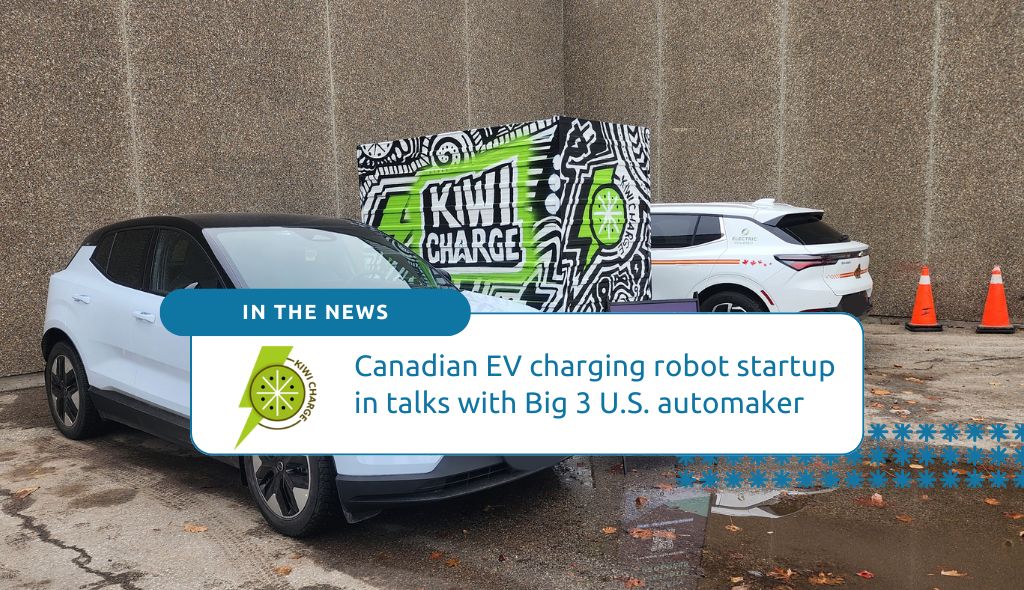When it comes to busting a big roadblock for electric vehicles, these may be the droids we’re looking for.
Canadian startup Kiwi Charge says robots that roam apartment and condo parking lots by night, charging depleted cars while their owners sleep, is a better and cheaper solution than adding cables fixed in place. The company has caught the eye of a Big Three U.S. automaker, two Canadian cities, and one of the country’s largest real estate developers.
Census data show about a third of Canada’s population live in multi-residential buildings. Condo and apartment dwellers with an EV often lack 24/7 access to a charger, a major perk for those who can install the equipment in their personal garage or driveway. For building owners, adding new spots to plug in is costly, particularly in older buildings, which may need retrofitting to handle the electrical load.
Such charging challenges have held back sales since the first EVs hit the streets. Recently, the lack of charging stations was cited as a top concern in a large study by EY. The accounting and consulting firm warns that electric vehicle purchase intentions are falling in Canada. Last week, a 4,500-person survey by DesRosiers Automotive Consultants found most Canadians want a black, gas-powered SUV.
This is bad news for the federal government’s plan to phase out sales of new internal combustion vehicles by 2035. According to Statistics Canada, battery electric, hybrid electric and plug-in hybrid vehicles accounted for just over 25 per cent of new motor vehicle registrations in Canada in the third quarter of 2024.
Toronto-based Kiwi Charge sees fixed chargers as a relic of internal combustion, modelled after gas pumps where drivers pull up for their fill. Founder Abdel Ali says his service is about 40 per cent cheaper to install in buildings than his closest competition.
“It’s going to be a seamless experience,” he told Yahoo Finance Canada. “Each robot can replace the equivalent of 30 Level 2 chargers.”
Kiwi Charge’s robot maps a building’s indoor parking structure, noting the location of customer cars. Vehicles don’t require any permanent modification to accept a charge. A proprietary cable connects the car’s charge port to a spot outside the vehicle for the robot to connect to. This end of the cable rolls out like a flap over the car’s bumper when it’s parked for the night, secured in place by the vehicle’s closed trunk lid.
So far, Kiwi Charge has a proof-of-concept robot that can navigate parking lots, find customer cars, and start a charging session without human help. A new version is in the works with a bigger battery and the ability to use AI and vehicle data to predict when a charge is needed. The company is working with the Vector Institute, an AI research hub supported by the Ontario government, to figure that out.
Ali says a fully fledged autonomous version is expected to be ready next year for a paid pilot project with Tridel Group, one of Canada’s largest privately held real estate firms. The company’s vast portfolio includes some of Toronto’s tallest residential skyscrapers.
“Tridel is excited to work with Kiwi Charge and its revolutionary technology,” Graeme Armster, Tridel’s director of innovation and sustainability, said in an email. “We believe this is going to change the landscape of electric vehicle charging and are proud to be involved as things evolve.”
“Developers are very interested in giving their residents access to EV charging. That’s where the whole industry is going,” Ali said. “We’re able to help them do it at a lower cost that can be passed down to the residents. That’s why they’re excited about this solution.”
Excitement about Kiwi Charge has spread to Detroit, home to General Motors (GM), Ford (F), and the North American division of Stellantis (STLA). According to Ali, Kiwi Charge is “in talks” with one of the so-called Big Three American automakers about their technology, and how future vehicles could be charged. Yahoo Finance Canada has agreed to withhold the automaker’s identity, as the talks are not yet public.
“What [they] see is that how chargers are set up right now, it’s a relic of gas cars,” Ali said.
He sees the connection point for electric vehicles and his charging robots as a feature that could one day be integrated into the bodies of cars and trucks.
For now, Kiwi Charge is testing its business model with a manual version of its robot. It’s basically a big battery on a trailer that’s towed into parking lots. Ali says a charge costs the same as using a Level 3 public charger, like those in Tesla’s (TSLA) Supercharger network.
“We’re live in two buildings, but we have 140 as part of our wait list,” Ali said. “We can’t service that right now.”
Kiwi Charge uses public chargers, most of which go unused late at night, to power up its battery on a trailer. The company is running a pilot project like this in Vaughan, Ont., and plans to start a pilot in Markham, Ont. in January. Both cities are about an hour’s drive north of downtown Toronto.
“Portable EV charging solutions eliminate a large barrier to EV adoption,” Markham Mayor Frank Scarpitti said via email. “Providing companies with a real-life environment to test, develop, and showcase breakthrough technologies . . . underscores Markham’s leadership in sustainability and smart mobility.”
While Ontario has no EV-ready building code requirements, cities including Toronto, Mississauga, and Waterloo have electrification rules in their municipal zoning laws. British Columbia and Quebec already have provincial EV readiness regulations in place.
EY Canada automotive and transportation leader Jennifer Rogers says EV charging, range anxiety, and affordability hurdles need to be cleared in order to boost sales from current levels.
“Beyond the early adopter phase, I think it’s going to be harder to turn people into electric vehicle owners,” she told Yahoo Finance Canada. “When you start getting beyond people with a single-family home, where it’s easier to have at-home charging, that poses challenges.”
Kiwi Charge is by no means the only company attempting to ease this convenience gap.
Los Angeles-based startup EV Safe Charge has a rolling robot called ZiGGY for charging EVs. The startup won a contest in 2023 to set up a pilot in municipal parking garages in Barcelona. However, it appears ZiGGY needs a human to connect with a vehicle’s plug. It’s designed to meet drivers at a designated parking spot after a reservation is placed via an app.
At the same time, Toronto-based startup SWTCH Energy says its electricity load management software lets aging multi-tenant buildings add 10 times as many EV chargers without costly infrastructure upgrades.
Meanwhile, Tesla continues to file patents pointing to a forthcoming wireless charging system.
“We’re ahead of the curve when it comes to our technology and some of the IP (intellectual property) that we’re developing,” Ali said.
“There are some competitors that come up, but we think that our solution from a technology perspective and a go-to-market perspective is ahead of the curve.”
Interested in getting started on your commercialization journey? Connect with us to learn how.






